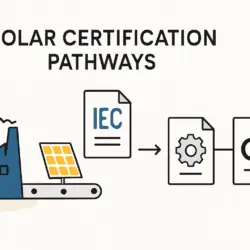Navigating Renewable Energy Barriers and Challenges in Belarus
Belarus faces significant obstacles in developing its renewable energy sector, with economic and geopolitical factors slowing its progress. Despite an urgent need to reduce reliance on Russian fossil fuels, the country is struggling to increase its renewable energy share, which remains below 8% of total energy consumption.
Economic and Political Barriers to Renewable Energy
A heavy dependence on Russian energy imports poses a significant challenge to Belarus’s renewable energy ambitions. The country imports over 80% of its energy, primarily from Russia—a dependency that constrains its ability to diversify sources and explore sustainable alternatives.
The construction of the Astravets nuclear power plant, primarily financed and technologically supported by Russia, further entrenches this dependency and diverts focus from renewable energy sources.
Economic hurdles compound these challenges. Looming foreign debt and low foreign exchange reserves make it difficult for Belarus to attract vital investments for renewable energy projects. International sanctions have only worsened the situation, stifling opportunities for foreign investment and technological collaboration.
Moreover, declining purchasing power and inflationary pressures complicate the financing of new energy projects. Political instability further deters potential investors, as the risk of economic volatility remains high.
Geopolitical Barriers to Renewable Energy
Belarus’s geopolitical position adds another layer of complexity to its renewable energy efforts. Strained relations with Western nations and a growing reliance on Russia make it difficult to secure independent energy partnerships, while the ongoing conflict in Ukraine has further limited the country’s ability to develop renewable projects.
The government’s focus on maintaining energy security through existing Russian partnerships has slowed the transition to renewables. This priority highlights the broader geopolitical challenges Belarus faces in diversifying its energy sources.
Overcoming Barriers Through International Cooperation
Despite these barriers, Belarus is exploring international cooperation to advance its renewable energy sector. The Ministry of Energy has launched pilot projects to test new technologies, with support from European and international organizations. These efforts aim to reduce the country’s energy dependence and greenhouse gas emissions.
However, the success of these initiatives depends on overcoming the country’s deep-seated economic, political, and geopolitical challenges. While the government’s commitment to renewable energy is crucial, it must be matched by international support to ensure the sector’s growth.
The Path Forward for Renewable Energy
To achieve its renewable energy goals, Belarus must address several key issues: reducing its energy dependence on Russia, attracting foreign investment, and fostering international cooperation.
The country’s political stability and economic resilience will be critical to creating a favorable environment for renewable energy development. The government must prioritize policies that encourage investment and innovation in renewable energy. At the same time, strengthening ties with international partners and diversifying energy sources will be crucial for reducing the country’s reliance on Russian imports.
Belarus faces significant challenges on its path toward renewable energy, but with strategic planning and international support, the country can overcome these obstacles and build a more sustainable energy future.



